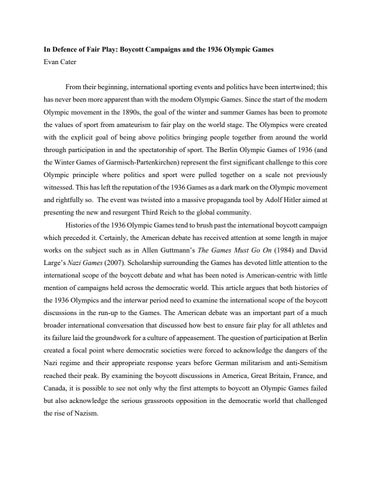In Defence of Fair Play: Boycott Campaigns and the 1936 Olympic Games Evan Cater From their beginning, international sporting events and politics have been intertwined; this has never been more apparent than with the modern Olympic Games. Since the start of the modern Olympic movement in the 1890s, the goal of the winter and summer Games has been to promote the values of sport from amateurism to fair play on the world stage. The Olympics were created with the explicit goal of being above politics bringing people together from around the world through participation in and the spectatorship of sport. The Berlin Olympic Games of 1936 (and the Winter Games of Garmisch-Partenkirchen) represent the first significant challenge to this core Olympic principle where politics and sport were pulled together on a scale not previously witnessed. This has left the reputation of the 1936 Games as a dark mark on the Olympic movement and rightfully so. The event was twisted into a massive propaganda tool by Adolf Hitler aimed at presenting the new and resurgent Third Reich to the global community. Histories of the 1936 Olympic Games tend to brush past the international boycott campaign which preceded it. Certainly, the American debate has received attention at some length in major works on the subject such as in Allen Guttmann’s The Games Must Go On (1984) and David Large’s Nazi Games (2007). Scholarship surrounding the Games has devoted little attention to the international scope of the boycott debate and what has been noted is American-centric with little mention of campaigns held across the democratic world. This article argues that both histories of the 1936 Olympics and the interwar period need to examine the international scope of the boycott discussions in the run-up to the Games. The American debate was an important part of a much broader international conversation that discussed how best to ensure fair play for all athletes and its failure laid the groundwork for a culture of appeasement. The question of participation at Berlin created a focal point where democratic societies were forced to acknowledge the dangers of the Nazi regime and their appropriate response years before German militarism and anti-Semitism reached their peak. By examining the boycott discussions in America, Great Britain, France, and Canada, it is possible to see not only why the first attempts to boycott an Olympic Games failed but also acknowledge the serious grassroots opposition in the democratic world that challenged the rise of Nazism.
Issuu converts static files into: digital portfolios, online yearbooks, online catalogs, digital photo albums and more. Sign up and create your flipbook.

